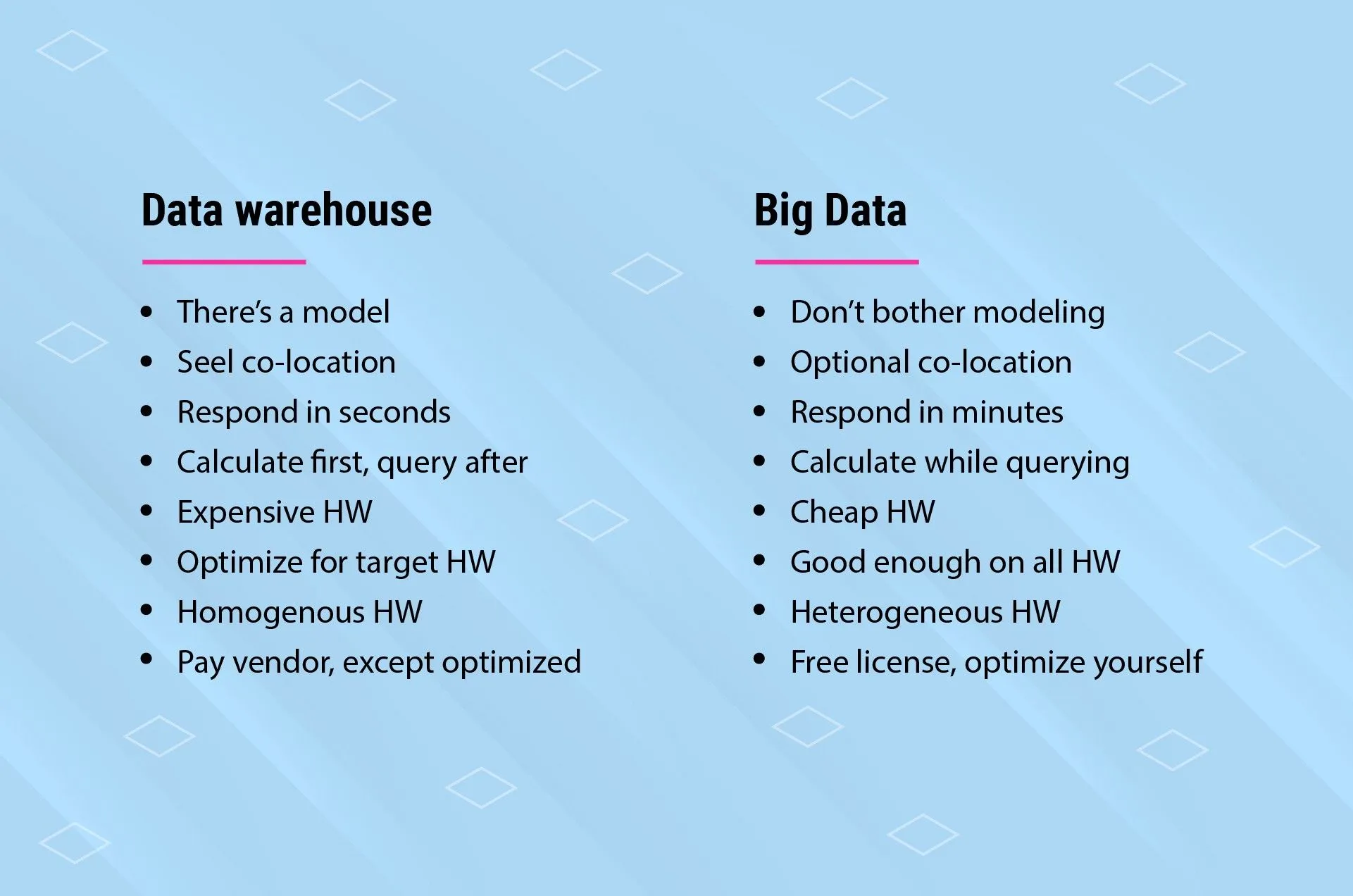Data Warehouse: What Is It and How Does It Relate to Big Data?
Table of contents
- What Is a Data Warehouse?
- Difference Between Big Data and Data Warehouse
- What are Data Warehouses Used for?
- Benefits of a Data Warehouse
- It ensures efficient BI
- It increases efficiency and saves time
- It contributes to better data quality
- It increases ROI
- It enables forecasting
- Possible Pitfalls
- The Bottom Line
The Big Data revolution has provided organizations with the most cost-effective way of processing structured, semi-structured, and unstructured data. But there is one more notion that appears when talking about data — data warehouse. And today, there are still a lot of questions on what it is and how it works. In this post, we are going to provide you with the answer, point out the difference between Big Data vs data warehouse, as well as show the data warehouse key benefits and pitfalls.
What Is a Data Warehouse?
Just like a warehouse in its traditional meaning stores goods, a data warehouse is the same kind of storage but for data. The term appeared more than 25 years ago, and it was formulated by Bill Inmon who defined a data warehouse as a collection of data to support decision making. Later, Greg Schulz, an analyst with Storage and Server IO Group, provided a more comprehensive definition, pointing out the key activities a data warehouse covers. These are reporting, business intelligence (BI), analytics, decision support (DSS), research, data mining, and others. Amounts of data in the warehouse are measured in 100s of TB, PBs, or even Exabytes in some cases.
Difference Between Big Data and Data Warehouse
The key difference between Big Data and data warehouse is that the first one is technology, while the latter is architecture. Here are more differentiators between these two.

What are Data Warehouses Used for?
For efficient and accurate data processing, analysis, and systematization, the data has to be structured. Each piece in a dataset has to adhere to its specific field. So when it comes to the data warehouse, its architecture and tools allow organizing data in the way to be accurately presented, properly processed, structured, and managed, in this way making it easier to find, access, visualize, and analyze information.
Benefits of a Data Warehouse
But what has been mentioned above is not the only advantage. The ability of a data warehouse to handle huge volumes of data and translate raw data into insights opens up space for a great number of business benefits.
It ensures efficient BI
Because a data warehouse enables dealing with information from different sources in the convenience of a single platform, it facilitates such business processes as market segmentation, sales, risk, inventory, and financial management.
It increases efficiency and saves time
Data warehouse significantly saves time for decision makers, as it stores and preserves standardized data sets instantly available to all users.
It contributes to better data quality
Transforming data coming from different sources into a consistent format, standardized by certain criteria, data warehouse enables the production of more accurate decisions, leading to better results.
It increases ROI
With better and faster decisions, companies can enjoy higher revenues and gain a competitive advantage on the market.
It enables forecasting
With a data warehouse, specialists can easily make market forecasts, identify potential KPIs, and gauge predicated results.
Possible Pitfalls
As you can see, there are numerous valuable business advantages offered by a data warehouse. Nevertheless, there are some pitfalls as well.
- First of all, because data warehouses go primarily around structured data, there is a lot of data left outside because it is not structured.
- Secondly, because the data warehouse is not the latest solution and many of its tools were invented decades ago, there are cases when it’s impossible to apply it to the modern Big Data and analytics tools.
- Thirdly, data warehouses can be quite expensive.
But even though there are some disadvantages, it is possible to avoid them. For example, organizations can update their data warehouse tools to improve functionality, as well as take advantage of cloud-based and open-source platforms that can accommodate both structured and some unstructured data sources.
The Bottom Line
While it is true that a data warehouse is not an innovative technology, it still brings a lot of business benefits, allowing organizations to effectively deal with data flows and make crucial decisions based on a comprehensive analysis. Furthermore, with updates of data warehouse tools, it is possible to combine the comparatively old solution with more innovative ones, taking the best of what each can offer.
At Emerline, we have a vast experience of dealing with data and a range of tools for its structuring, storing, analysis, etc. So if you're looking for a solution that will allow you to take advantage of all important information coming from different sources, feel free to contact us for a consultation. We are here to help you unlock the power of technology for your business growth.
Published on Aug 14, 2020





